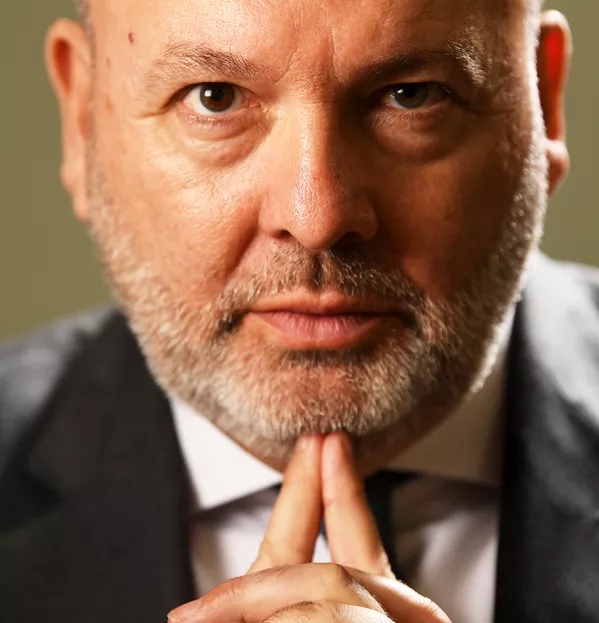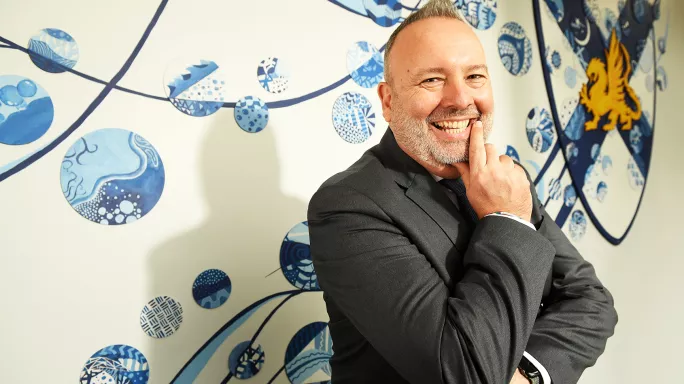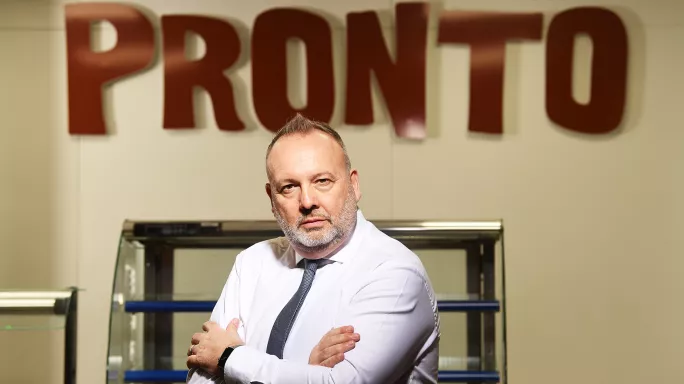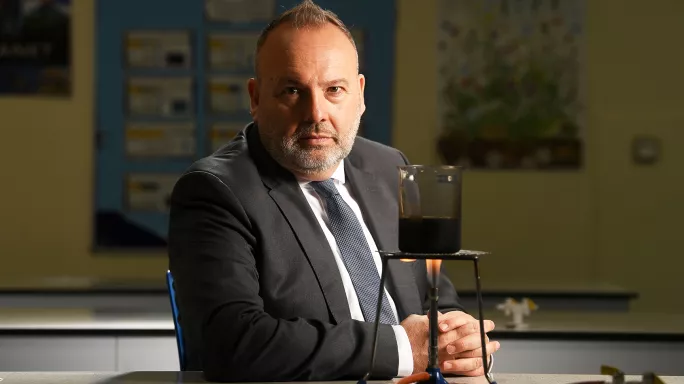Pepe Di’Iasio on funding, pay and ‘streamlining’ the middle tier

The next government needs to “shine a greater lens on the middle sector”, the incoming general secretary of the Association of School and College Leaders (ASCL) has said.
Pepe Di’Iasio believes the middle sector - a term he uses to describe a “tier of bureaucracy” between government and schools that includes the Education and Skills Funding Agency and the Department for Education’s regional directors - causes “unnecessary stress and workload”, and needs “delineation” and “streamlining”.
It’s an interesting point of focus for Di’Iasio as he steps down as headteacher of Wales High School, near Sheffield, and inherits the mantle of ASCL in the stormy year of a general election, with a likely change in government ahead.
He will be stepping into the “big boots” of Geoff Barton, who has won plaudits for taking on big issues such as teacher pay. Di’Iasio, whose term as general secretary begins next month, says he wants to continue the legacy of being the “voice of leaders throughout the country”. So is that middle tier a priority for those leaders?
- Background: Pepe Di’Iasio confirmed as ASCL general secretary
- MAT Tracker: Mapping the country’s multi-academy trusts
- Geoff Barton: ‘You have to let people screw up’
While he says that the sector should not “go down the rabbit hole” of becoming “bogged” down in talking about school structures, the majority of his members will now work in - and lead - trusts.
He says that for these members, the “level of bureaucracy” the middle tier brings has “almost come out of nowhere” over the past decade, and that this is generating more work and more stress for those members, with little rationale for either.
As every school leader up and down the country is looking at efficiencies in a period where budgets are “very tight”, Di’Iasio says he is keen for the next government to scrutinise just how much money is spent on the middle tier.
Di’Iasio is keen to talk more broadly about funding, too, of course. The economic picture for schools is not a positive one. The Kreston UK Academies Benchmark Report 2024, published last month, revealed that the number of academy trusts reporting in-year deficits has risen substantially.
Just last week, the Institute for Fiscal Studies said that schools would need £3.2 billion in extra funding to address the loss of purchasing power in budgets since 2010.

Amid this uncertainty, Di’Iasio has a list of questions he wants the next government to ask: is the system as it exists value for money? How much is spent on it? What efficiencies are there? And finally, “who watches the watchdogs?”
What he won’t ask a future government is whether there is any more money in the public purse to give to schools: he is certain there is.
“I don’t buy this idea that there aren’t the funds,” he states. “But I can understand that the plans that [the Labour party] are putting in place have to be within a fiscal constraint and they need to show that they can manage the public purse.”
For Di’Iasio, the key appears to be how the government chooses to spend money, as much as the amount it spends. And here he is certain that there needs to be a big and bold investment in provision and support for pupils with special educational needs and disabilities (SEND).
A survey last summer suggested that about seven in 10 teachers believe that students with SEND or additional learning needs are “being ineffectively supported by the current education system”.
SEND funding
It’s a problem that even the education secretary Gillian Keegan cannot shy away from. She recently called the level of provision a ”lose-lose-lose situation”.
As is the case for all leaders, the current situation is something that is close to home for Di’Iasio. He tells Tes that he runs an autism spectrum disorder additional resource connected to his school and teaches a “high number of students with SEND”.
As a result, Di’Iasio has his own tough fiscal decisions to make. If his school is going to continue to “give the quality of service and the quality provision that those students require”, it will result in a half-a-million pound deficit.
He says that money will “have to come from somewhere” and it has to be recognised that that is a “key priority both within our school here, but across the whole country”.
On receiving SEND support, ASCL’s incoming general secretary feels that the sector has for too long been “bogged down in what is essentially a postcode lottery”.

“In the middle of all of that,” Di’Iasio says, “are young people going through an education system on a daily basis, not getting the...provision that they should get throughout their entire time at school, and as a result of that they’re being disadvantaged every day through their educational career.”
The government’s SEND and Alternative Provision Improvement Plan - published more than a year ago - included creating new national standards in SEND and moving to a digitised system for education, health and care plans.
Di’Iasio says: “If we don’t recognise that [plan] means proper investment and proper support, then that won’t be realised.”
Aside from SEND, Di’Iasio will immediately face the teacher pay issue when he takes up the role. Last year, all four education unions balloted members over strike action in what was seen as an unprecedented campaign.
ASCL would consider ‘stronger action’ on pay
However, those disputes came to an end after the government offered teachers and leaders a 6.5 per cent pay award for this year, following the recommendation from the independent pay review body.
Is Di’Iasio expecting to have to fight on the pay issue once again this year? He hopes he won’t. But he says that ASCL would consider “stronger action again” if members say the pay offer made to the sector this year isn’t fair.
“That would be the tipping point. I think if we felt that our members were telling us that this was not fair, this was not appropriate, then we’d need to consider stronger action again,” Di’Iasio explains.
He hopes the sector will see a “similar level of support” from the School Teachers’ Review Body again this year, when the time comes for the government to be advised on pay.
A Department for Education spokesperson said it had delivered on “the manifesto commitment to give every new teacher a starting salary of at least £30,000 and implemented the highest pay award in 30 years”.

Last week, the government published its submission to the pay review body, which recommended that teachers’ pay rises should be lower than the past two years and return to “a more sustainable level” next year. However, in a slightly unexpected move, the government neglected to spell out an explicit pay rise percentage for 2024-25.
Di’Iasio says that it is “obvious that teacher pay has to significantly improve to address the crisis and yet the DfE downplays the gravity of the problem and states the pay award for 2024-25 should be set at a ‘more sustainable level’”.
But the context, Di’Iasio adds, is that there just “isn’t enough money in the system to afford the level of award needed to address recruitment and retention, and the chancellor did nothing in his Spring Budget to improve the situation”.
Of course, pay isn’t the only factor in the recruitment and retention crisis engulfing teaching. Workload, the collapse of public services and many other factors are contributors.
Teacher burnout
A poll by Teacher Tapp last year found that the proportion of senior leadership team members experiencing consistent feelings of “burnout” had more than doubled over the past five years.
A rapid increase in vexatious complaints, as revealed by Tes this week, is also pushing schools with stretched resources and already-stressed staff to the brink.
Di’Iasio agrees that a “keyboard culture” has been established, and that some people think it is “entirely appropriate to send a complaint to the school, to Ofsted, to the DfE, to the prime minister, to the local MP”.
“Often,” he explains, the complaint is “well beyond the realms of a decision that’s been made here [at the school]. We need parents to understand that we’re in this together and that we’re doing the very best we can in the interests of the young people that we’re working with.”
He adds that the country needs to work “really hard to ensure that parents feel like they have a voice...but it needs to be done in an appropriate way”.
Di’Iasio wants schools to be ‘optimistic’
Part of that effort will be talking the sector up, as well as recognising its challenges, says Di’Iasio. He believes that optimism needs to be a fundamental part of his role at ASCL.
He wants schools to be “optimistic” about changes to come, and leaders to be “proud of the difference they are making”.
He points to Ofsted as an example of where positive change is evident, with a “sea change in philosophy” at the inspectorate.
Criticisms made in a coroner’s report following the inquest into the death of headteacher Ruth Perry led the new chief inspector Sir Martyn Oliver to set out a series of measures that the inspectorate would take to address them.
Di’Iasio thinks that the sector should be positive “about the tone” that Sir Martyn is setting.
Positivity and optimism will be a tough approach to maintain, given the challenges Di’Iasio has highlighted above, but colleagues say he will manage it: they say his positivity is genuine and evident in how he operates, and say how much his authenticity is appreciated by those with whom he works.
Whether Di’Iasio manages to retain this optimism as the year goes on, and decisions around efficiencies for schools perhaps make things worse, will soon become apparent. But for now, a balanced narrative is very much the position the new general secretary of ASCL will be pushing.
For the latest education news and analysis delivered directly to your inbox every weekday morning, sign up to the Tes Daily newsletter
You need a Tes subscription to read this article
Subscribe now to read this article and get other subscriber-only content:
- Unlimited access to all Tes magazine content
- Exclusive subscriber-only stories
- Award-winning email newsletters
Already a subscriber? Log in
You need a subscription to read this article
Subscribe now to read this article and get other subscriber-only content, including:
- Unlimited access to all Tes magazine content
- Exclusive subscriber-only stories
- Award-winning email newsletters



